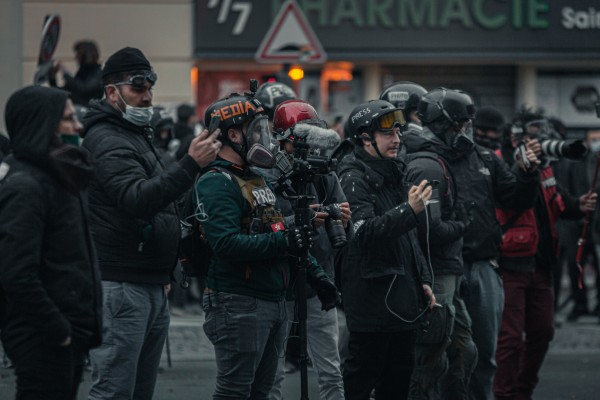Mr. José Manuel Barroso
President of the European Commission
European Commission
200 rue de la Loi
1049 Brussels
Belgium
Fax: (+ 322) 295 01 38
Vienna, 11 March 2005
Dear Mr. President,
The International Press Institute (IPI), the global network of editors, media executives and leading journalists, is writing to express its grave concern at the continued detention of Austrian journalist Sandra Bakutz and to call on you, as President of the European Commission, to immediately raise her case with the Turkish government.
Bakutz, a producer with the Vienna-based Radio Orange 94.0, was arrested on 10 February after flying to Atatürk airport, Istanbul, with the intention of reporting on a trial of 64 prisoners arrested on 1 April 2004. Since then she has been charged with being a member of a terrorist organisation – the Revolutionary People’s Liberation Party-Front (DHKP/C). She is currently being held in the Ulucanlar prison near Ankara and her first hearing in court will be held on 30 March.
Although IPI has not been given access to the legal documents regarding the charges and evidence in support, it appears that one of the reasons for Bakutz’s arrest dates back to her involvement in a Brussels press conference in 2001 given by the Turkish Minister of Foreign Affairs Ysmail Cem.
According to IPI’s sources, it appears that the Turkish authorities believe that she opened the doors of the hall where the press conference was being held, allowing members of the DHKP-C to enter and demonstrate against Turkey. Based on this evidence, it seems that the Turkish authorities believe Bakutz is a member of, or has a relationship with, the proscribed organisation.
In the opinion of IPI, there are a numbering of troubling issues raised by Bakutz’s case that warrant further investigation by the European Union.
Given the fact that the DHKP/C is a proscribed organisation of both the European Union and the United States, and taking into account the fact that the Turkish authorities have known of Bakutz’s apparent membership since 2001, IPI simply cannot understand why the Turkish authorities did not inform the Belgian legal authorities at this time. Moreover, the Turkish authorities might also have sought the assistance of the Belgian authorities under the various European terrorism laws.
Based on the available facts, it appears that the Turkish authorities have sought to do neither, and instead have preferred to await Bakutz’s unsuspecting appearance on their own soil before proceeding against her. Such behaviour appears to clearly undermine the claim that Bakutz was a member of a terrorist organisation.
IPI is also puzzled by the failure of the Belgian authorities to act against her. If Bakutz was truly a member of the DHKP-C and, taking into account once again the fact that the organisation is proscribed by the European Union, it appears strange that the Belgian authorities failed to act against Bakutz when she was in Brussels in 2001.
Applying the same logic, and accepting the need ever since September 11 for countries to work together in the fight against terrorism, it is extraordinary that the Austrian authorities have allowed Bakutz to practice her journalism profession in Vienna without seeking to arrest her on suspicion of being a member of a proscribed organisation.
The fact that the authorities in both countries have not done so again throws further doubt on the claim that Bakutz is a member of a terrorist organisation.
Another claim, based on information provided to IPI, is that Bakutz was tried in absentia in a Turkish court for the events of 2001. If true, IPI believes that it breaches a number of important legal principles that are upheld as fundamental to any democracy by the European Union and its member countries.
First and foremost, trial in absentia prevents the defendants from being heard in their own defence. In addition, the defendant is prevented from seeking the advice of legal counsel, cross-examining witnesses, disputing evidence and offering the court a defence. These are essential elements of any legal system and, in the case of Bakutz, they were all denied to her.
A trial in absentia also allows the state to secretly store guilty verdicts against a defendant that can be issued and applied at any time in the future. In this role, the state assumes the position of legal conjuror, pulling from the hat arrest warrants, charges and verdicts whenever it deems it necessary. This creates a deeply prejudicial legal system operating more in shadow than in daylight, once again undermining the rule of law.
On the basis of the above, it would appear that not only has Turkey failed to make the case for detaining Bakutz, it also seems apparent that the real reason for holding her is because of her social and political beliefs and the embarrassment caused to the Turkish government. However, the right of Bakutz to freely express herself and practice her profession as a journalist are essential to a working democracy.
Regarding freedom of expression, IPI would remind Your Excellency that the main human rights court in Europe, the European Court on Human Rights (ECtHR), has enshrined the right of individuals to peacefully express their opinions. Furthermore, both the European Convention on Human Rights and the Universal Declaration of Human Rights allow for individuals to freely receive and impart information.
By arresting Bakutz and by imprisoning her, the Turkish authorities have shown little regard for these universal principles and, by their actions, they have damaged their own credibility and the claims that Turkey has emerged from a long period of authoritarian rule and will shortly take its place among the nations that make up the European Union. But, perhaps more than this, IPI wishes to point out that, as well as Turkey, the credibility of the European Union is also at stake.
The European Union has already accepted Turkey as a potential member of the European Union and accession talks are to begin later this year. IPI believes that the case of Bakutz represents the first real test for the way that the European Union intends to deal with a country that has routinely breached human rights and press freedom. If Turkey is to successfully move away from its repressive past and introduce laws and safeguards that uphold such principles, it must first be encouraged to do so by the European Union.
With this in mind, IPI calls on you to take up the case of Bakutz with the Turkish authorities and to encourage them to release her from jail immediately.
We thank you for your attention.
Yours sincerely,
Johann P. Fritz
Director


